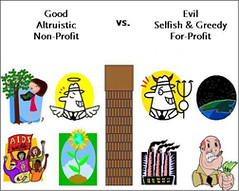
Most public relations executives, especially those looking for a position, would be happy being featured as the lead in an interview for a Forbes article. Not Judith Lederman.
The 50-year-old divorcee who lives in Scarsdale, N.Y. who has yet to replace her former $120,000 salary as a publicity manager at Lord & Taylor took exception to the way the article portrayed her. Calling the reporter out on her blog, she wrote "Instead of painting me as someone seeking an appropriate salary so she could support herself, it portrays me as someone who is torn between the prospect of being employed and being eligible for tax breaks, college scholarships and other incentives."
Except, as Steven Spenser, principal of Praxis Communication in Seattle, commented in response to her post: "I must have read a different article, because I didn't find any text that indicated you want entitlements or handouts." Spenser is right. The perception Lederman had about the story is not the perception that most people will draw from the story. And that's too bad.
Given her uncomfortable position, I don't want to berate Lederman. Rather, I want to focus on the lesson to be learned for new public relations practitioners, especially those who are entering an era where publicly responding to the media is all too easy to do. And based on the lead in to the post, Lederman knew it too.
"I'm going to go out on a limb here - because I know that in the business of public relations, which is my business - and has been for many years - calling a journalist on the carpet for misrepresenting your point of view, can cost a PR person valuable contacts," she began before sharing an e-mail to the reporter to express her post-interview, pre-article sentiments.
What Went Wrong?
The e-mail she wrote (and posted) to the reporter seems to provide a glimpse. Lederman finished the interview and concluded that she was pretty far off from her personal message in a story — one that questions a tax structure which provides incentive for underperformance and disincentives for working harder — she would have preferred not to be featured. It happens. At one point, she even says that she told the reporter to find another person to profile.
It doesn't work that way. While reporters sometimes consider post-interview jitters correspondence, especially in feature pieces, there is considerable risk in writing them out of desperation. In this case, if anything, Janet Novack seems to have listened to Lederman's pleas and restructured the story so that it sticks to the facts. And the facts are the facts.
Regardless of how Lederman feels about the conclusions being drawn, Novack is right. Not finding a job or taking a job for half the salary might be the better bet for Lederman and her daughter. That doesn't mean Lederman, who is inclined to work harder for less of everything in order to feel self-sufficient, wants handouts. It only means that the country's current direction caps success because once someone reaches a certain financial step, they may make less than they did at the step before and, sometimes, two or three steps before.
So, unfortunately, in the Forbes piece, Lederman is a champion against a flawed system. In her post, she presents the very image she wanted to avoid. She comes across as a victim.
Perception Is Powerful.
PRNewser framed up the conversation asking whether Lederman made the prudent move to correct the reporter, if her protest will raise doubts about her abilities, and whether she should have accepted the interview given the context. Lederman addresses some of these questions in the comments that follow, but the initial questions seemed like the wrong ones.
Ergo, while there is nothing wrong with correcting a reporter who misrepresents facts, there is something wrong with being overly concerned about how journalists "present" us beyond the facts, especially when the concern seems to be confined to labels. Most people don't read labels — hard-working professionals looking for comparable work even if it means sacrificing benefits for her daughter's education vs. a whiney 50-year-old single mom looking to cheat the system (as Lederman framed it up) — as much as they saw Lederman, or in this case, a metaphor for dozens of middle-class families.
Sure, there were some commenters who scoffed at her former salary, but most of those could be dismissed for ignorance. When you consider the cost of living is significantly higher in New York compared to other areas, $120,000 suddenly becomes a low-to-mid middle income with a position that probably meant long hours and family sacrifice. Besides, she doesn't make that now and her home is a risk so what does it matter?
Aside from the mistaken follow-ups with the reporter, the real miss here wasn't the story as much as it was a post-story opportunity. Lederman could be grateful for being included because it might had led to job offers. She could have pointed to the article, which sums her resume up nicely enough. And, she could have expounded on her personal views about this subject in a positive manner, picking up on any details that she felt were important but left out. All of this could have been done for a net gain.
Instead, the lessons to be learned here are threefold: manage the message or the message will manage you; measure the facts and not necessarily mistaken inferences made by anonymous commenters; never place too much emphasis on labels, especially those that no one will remember.
Had she left it alone or expounded with the positive, all anyone would remember is that she was featured in Forbes. Instead, all they will remember is ... well ... ho hum.

























